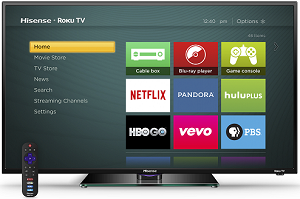
Source: Roku Inc.
CU denies the companies’ claims that there is already plenty of competition in the cable business, citing “[w]idespread consumer complaints of high prices, poor service, and no choices … [as] unmistakable hallmarks of an absence of meaningful competition.” A merger can only strengthen the dominance of the two companies in the respective regions of the country.
The companies have also argued that because they serve different regions, a merger would not harm competition. CU responds that by the logic of that narrow view, Comcast would be able to acquire any cable company anywhere in any market that it does not already serve, essentially creating a monopoly. The proposed merger, CU said:
This merger would give a single company unprecedented control over key video programming, together with unprecedented control over the means by which video programming is distributed to American consumers, and create a national “gatekeeper” of the Internet. These harms cannot be prevented or fixed by isolated divestitures, or by imposing conditions that ask Comcast to refrain from taking advantage of its power to enrich itself by blocking competition from others. The only effective response to the application, the only response that will serve the public interest, is to deny the application.
READ ALSO: Wireless Broadband No Competition for Comcast, Time Warner Merger
The filing also claims that Comcast has already shown that it is both willing and able to use its existing market power to head-off competition from online video streaming competitors like Netflix Inc. (NASDAQ: NFLX). CU cites the February agreement between Comcast and Netflix as an example of how the cable company “forced” Netflix to pay what the company described as an add-on “toll” or “tax” in order to reach Netflix’s millions of subscribers.
Comcast also has claimed that it needs to grow in order spread its fixed costs around, to which CU responds that any reductions in the company’s fixed costs are likely to be small and are certainly speculative. Another argument that CU attributes to Comcast and Time Warner is that the merger would allow them to offer the “the best of both,” which CU says ignores the incompatibilities between the two networks’ equipment and technologies. Finally, Comcast’s promise to increase inexpensive or even free access to underserved and low-income households could just as easily be made to happen without a merger.
The consumer group concludes:
Combining these two monopolies makes for a bigger, more powerful, more nationwide monopoly, with even greater incentive to restrict consumer choices, and even less incentive to improve customer service. Accordingly, we urge the Commission not to approve this merger. Conditions and divestitures will not be effective in preventing or overcoming the significant harm the merger would cause.
READ ALSO: Customer Service Hall of Shame
The full filing contains supporting data for CU’s conclusions based on a June poll by the Consumer Reports National Research Center that showed only 11% of the public supports the proposed merger, while 56% oppose the merger and 32% have no opinion.
Essential Tips for Investing: Sponsored
A financial advisor can help you understand the advantages and disadvantages of investment properties. Finding a qualified financial advisor doesn’t have to be hard. SmartAsset’s free tool matches you with up to three financial advisors who serve your area, and you can interview your advisor matches at no cost to decide which one is right for you. If you’re ready to find an advisor who can help you achieve your financial goals, get started now.
Investing in real estate can diversify your portfolio. But expanding your horizons may add additional costs. If you’re an investor looking to minimize expenses, consider checking out online brokerages. They often offer low investment fees, helping you maximize your profit.
Thank you for reading! Have some feedback for us?
Contact the 24/7 Wall St. editorial team.



